No one would refuse delicious raspberries, not even our pets. This gourmet fruit is consumed in every way possible. It can be found in juices, smoothies, fruit salads, ice creams, on top of desserts, etc. Additionally, it is not just tasty, but also very healthy as well. As our guinea pigs are herbivores, we can say that they can eat raspberries, right?
Can guinea pigs eat raspberries? Guinea pigs can eat raspberries. This fruit is rich in vitamin C, which is amazing for guinea pigs. However, as with any type of fruit, raspberries have sugar as well. That’s why raspberries should be fed in moderate serving sizes and not too often.
Guinea pigs can taste and enjoy this delicious fruit. However, we must pay attention to how often we feed them raspberries in order to avoid any health problems. In the sections below, we will discuss all the risks, benefits, and useful facts about raspberries as potential food for your guinea pig. Let’s begin!
Table of Content
Are Raspberries Good for Guinea Pigs? | Health Benefits
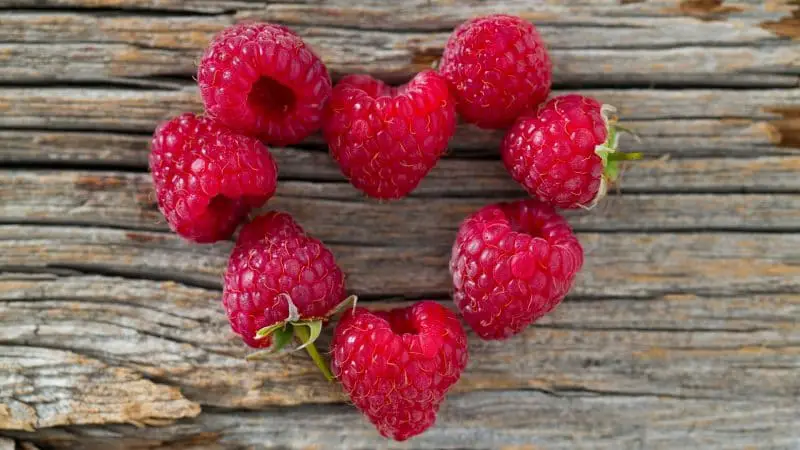
Scurvy Prevention
Guinea pigs don’t produce vitamin C naturally, and they can’t store it either. They need a constant supply of this vitamin in order to maintain perfect health.
The vitamin C in raspberries will make the guinea pigs healthier. Also, vitamin C prevents a dangerous disease in guinea pigs called scurvy. Some symptoms of this disease are no appetite, weight loss, diarrhea, discharge and bleedings, rough coat, etc.
Antioxidants
Raspberries are rich in antioxidants. Vitamin A, for example, is one of the stronger antioxidants present in raspberries, and it practically removes the risk of any chronic disease. It removes the free radicals from the body and helps with the inflammation as well.
Apart from the immunity boost, the kidneys, lungs, heart, skin, and vision will be much better. Also, antioxidants in raspberries protect against cancer in guinea pigs. In addition, vitamin E keeps the skin healthy, fights off inflammations of the skin, and also prevents skin cancer as well.
Healthy Bones and Muscles
Mineral magnesium removes muscle pains. It keeps all the muscle tissues healthy and strong, and it can also prevent diabetes and anxiety. Vitamin K in raspberries protects the guinea pig’s bones and keeps them strong and healthy. Also, if the guinea pig gets hurt, the wounds will heal faster with the help of this vitamin.
Healthy Cardiovascular System
It is good news that raspberries don’t contain much fat. Less fat is good for the cardiovascular system because the blood vessels will remain unclogged.
The iron and copper in raspberries will make the blood healthier and less prone to anemia. Moreover, potassium balances the blood pressure, and it keeps the cardiovascular health in good shape as well.
Nutrition Facts of Raspberries for Guinea Pigs
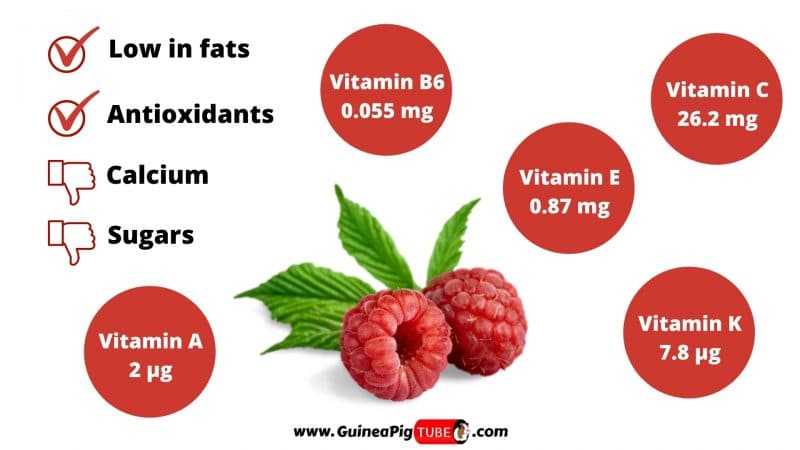
For 100 g (3 oz) of raspberries, the following are the nutrition facts:
- Energy – 52 kcal
- Protein – 1.2 g
- Total lipid (fat) – 0.65 g
- Carbs – 11.94 g
- Dietary fiber – 6.5 g
- Sugars – 4.42 g
- Calcium – 25 mg
- Iron – 0.69 mg
- Magnesium – 22 mg
- Phosphorus – 29 mg
- Potassium – 151 mg
- Sodium – 1 mg
- Zinc – 0.42 mg
- Copper – 0.09 mg
- Selenium – 0.2 µg
- Vitamin C – 26.2 mg
- Vitamin B-6 – 0.055 mg
- Vitamin A – 2 µg
- Vitamin E – 0.87 mg
- Vitamin K – 7.8 µg
- Thiamin – 0.032 mg
- Riboflavin – 0.038 mg
- Niacin – 0.598 mg
- Folates – 21 µg
- Carotene, beta – 12 µg
- Carotene, alpha – 16 µg
- Lutein + zeaxanthin – 136 µg
Are Raspberries Poisonous to Guinea Pigs? | Possible Risks
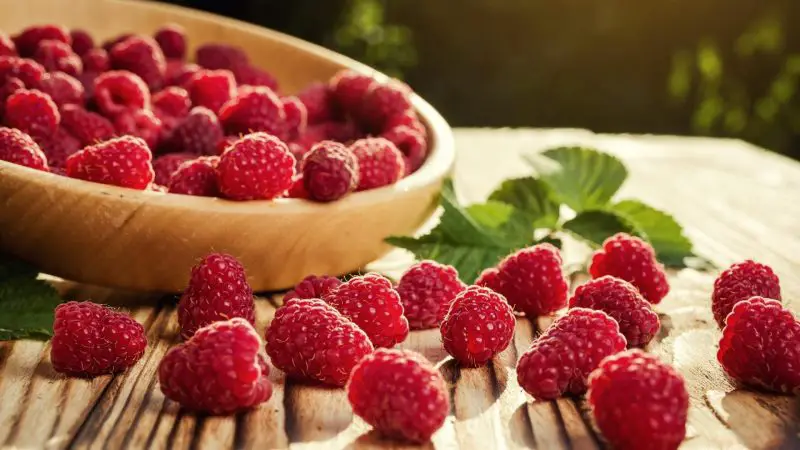
Urinary Problems
The calcium in the raspberries is a serious threat to the health of the guinea pigs. When guinea pigs grow up, they don’t need calcium as much.
Only when they are young, they can use this mineral for the formation of strong bone tissues. If grown guinea pigs consume too much calcium, they can get urinary stones, blood in urine, or even infection and pain in the urinary tract.
Painful Digestion and Upset Stomach
The raspberries have quite a lot of sugar, and fibers too. This is definitely not good for the guinea pigs. These two nutrients combined in large doses will upset the tummy of your guinea pigs. They can get gases, loose stool, pains, and cramping, so feed them raspberries only in small amounts!
Also, the amount of fiber is good, and it will improve digestion and bowel movements. If the guinea pig lacks fibers in its diet, it will suffer from constipation. On the other hand, if it eats too much fiber, it can get gases and loose stool.
Risk of Weight Changes
There is a small risk of weight gain from eating raspberries. They are not very caloric, but they have many carbs and sugars (the main factors for weight gain).
So, carbs could contribute to weight gain if the guinea pigs eat too many raspberries. But, this won’t happen to your guinea pigs if you feed them raspberries only in small amounts.
Serving Size and Frequency of Raspberries for Guinea Pigs
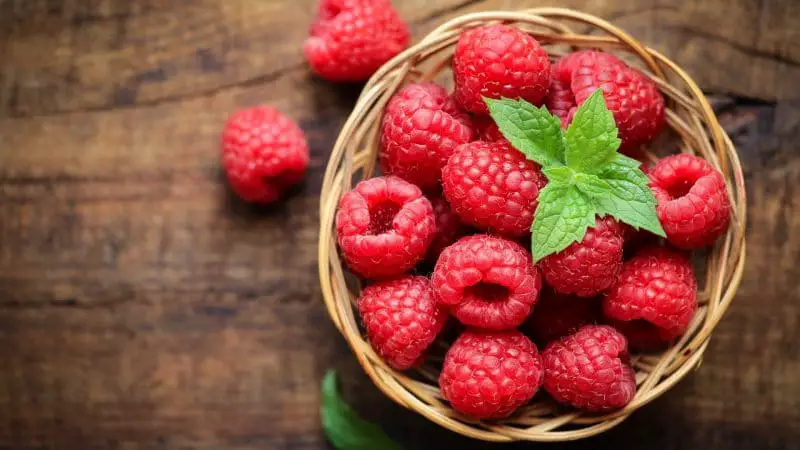
Can Guinea Pigs Have Raspberries Every Day?
Guinea pigs shouldn’t eat raspberries every day. Remember, some possible risks may happen if you feed raspberries to guinea pigs very often. It would be best if you were careful with the frequency of raspberries in order to avoid health risks.
Also, guinea pigs need to have a versatile diet, and it’s not good to feed them the same fruit every day. It’s recommended to feed guinea pigs with raspberries only two times per week as a treat.
How Many Raspberries Can Guinea Pigs Eat?
Guinea pigs shouldn’t eat raspberries in huge amounts, and less than a handful for a serving size is more than enough. That means two or three raspberries at once per one guinea pig. According to the possible risks mentioned above, anything more than that can cause health problems to them.
Can Baby Guinea Pigs Eat Raspberries?
Guinea pigs are gentle animals with a susceptible digestive system. When it comes to baby guinea pigs, they are even more sensitive. Baby guinea pigs can’t eat raspberries, and during that period, you should be very careful with their diet.
In the first few weeks, baby guinea pigs can eat only their mother’s milk. After some time, you should start feeding them alfalfa hay and pellets. After that, you can try to introduce them to small amounts of fruits and vegetables. Also, we suggest that you visit your vet in order to learn more about the baby guinea pig’s diet.
More Information About Raspberries and Guinea Pigs
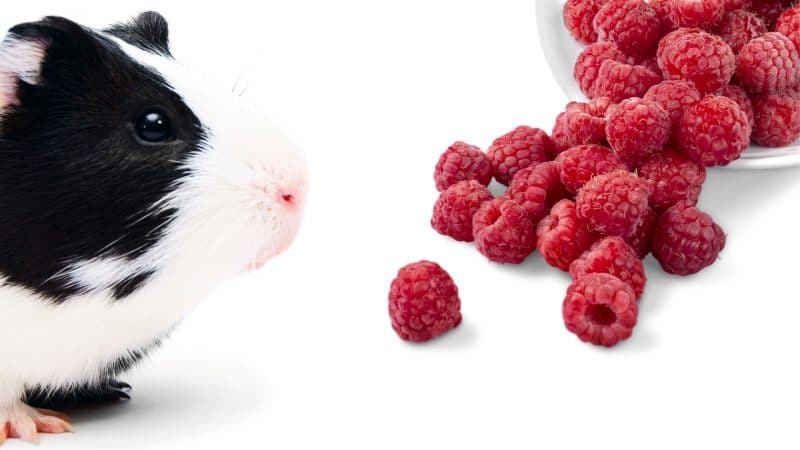
Can Guinea Pigs Eat Raspberry Leaves?
Raspberry leaves aren’t poisonous to guinea pigs. They can them as a treat. But, because raspberry leaves contain a lot of calcium, feed them these leaves only in moderation.
Can Guinea Pigs Eat Raspberry Canes?
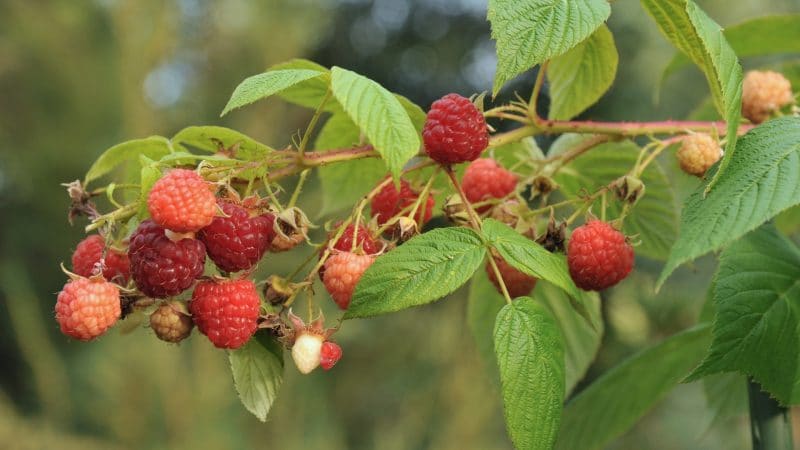
Guinea pigs can’t eat raspberry canes because they can be a choking hazard to them. Raspberry canes are too hard for guinea pigs, and they have small prickles (thorns) that can hurt guinea pigs’ lips and the inside of their mouth.
Also, raspberry canes can get stuck between guinea pig’s teeth and cause problems. So, it’s better to avoid feeding raspberry canes to guinea pigs in order to avoid problems.
Can Guinea Pigs Eat Red Raspberries?
Red raspberries are one of the most popular and commercial types of raspberry cultivars. Guinea pigs can eat red raspberries, but only in moderation. Red raspberries are high in beneficial vitamins and minerals. But due to calcium, sugar, and carbs, you need to be careful with the serving sizes.
Can Guinea Pigs Eat Black Raspberries?
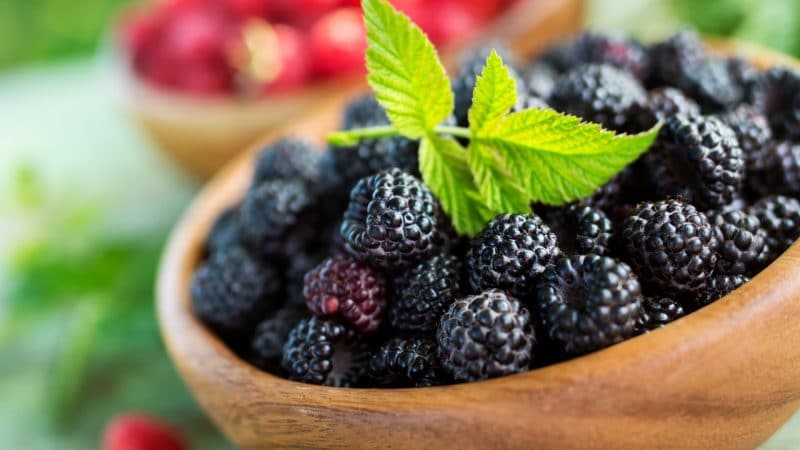
Black raspberries are another one types of raspberries, and people often confuse them with blackberries. These two fruits are related and look similar, but they are not the same. They differ in growing season and flavor.
Guinea pigs can eat black raspberries, but also only as a treat. That means they can’t eat them every day and in huge amounts. Black raspberries are also rich in different vitamins and minerals that may be beneficial for guinea pigs’ health.
Can Guinea Pigs Eat Wild Raspberries?
There are many wild raspberries globally, and you need to be careful which one you will give to your guinea pigs. It’s known that some of the berries found in the wild may be poisonous.
Guinea pigs can eat red or black wild raspberries that are the most common in the wild. In general, they can eat any wild raspberries that are safe for humans.
Just be careful with serving sizes and frequency. Also, if you’re not sure which raspberries you have found in the wild, it’s better just to avoid them.
Can Guinea Pigs Eat Dried Raspberries?
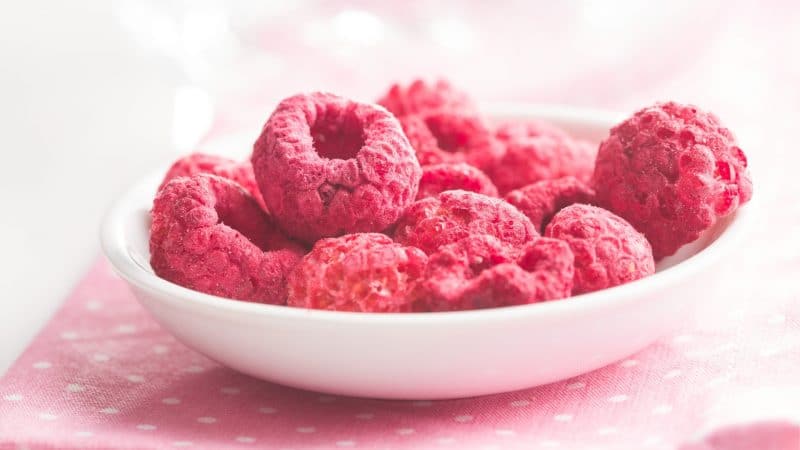
Guinea pigs can’t eat dried raspberries because they are herbivore animals that can eat only fresh and raw fruits and vegetables. Maybe you will read somewhere that dried raspberries aren’t so bad for guinea pigs, but we don’t recommend them. That’s because dried raspberries lose their nutritional value. Because of that, they don’t have enough benefits for our guinea pigs.
Also, guinea pigs may have problems digesting dried raspberries because they usually have added sugars and other additives. So, it’s better to avoid dried raspberries or any other type of dried fruits such as dried apricots or dried bananas for guinea pigs.
Provide them only fresh and raw raspberries. Be sure to wash them thoroughly with water due to possible dirt and pesticide remains.
Can Guinea Pigs Eat Frozen Raspberries?
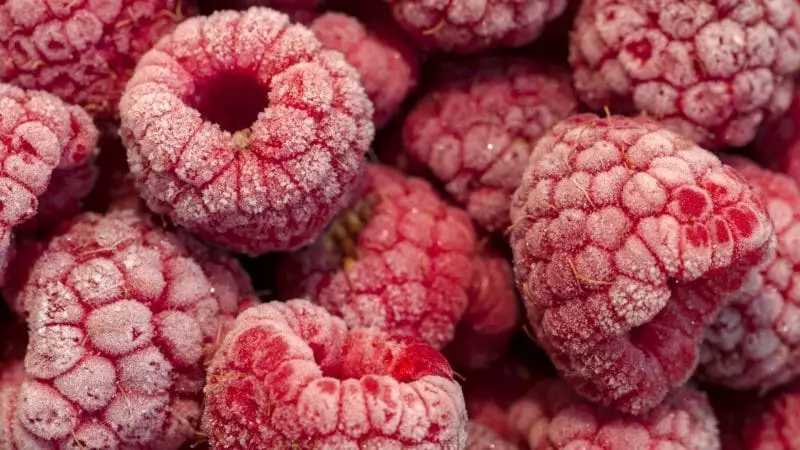
People usually freeze fruits and vegetables to make them last longer. However, frozen raspberries aren’t good for guinea pigs, and they shouldn’t eat them. If guinea pigs eat frozen raspberries, they may develop stomach and digestive problems.
Also, frozen raspberries are cold and may be harmful to guinea pigs’ teeth. But, they can eat frozen raspberries if you have previously defrosted them at room temperature and if they weren’t processed in any way before freezing. However, we recommend feeding guinea pigs only fresh raspberries.
Can Guinea Pigs Eat Augason Farms Raspberries?
Augason farms raspberries are commercially branded frozen and dried raspberries. Guinea pigs can’t eat Augason farms raspberries.
Even if the company has stated that these raspberries are full of flavor, antioxidants, and vitamin C, we don’t recommend feeding them to guinea pigs.
Augason farms raspberries aren’t beneficial to guinea pigs, and they may only cause stomach and digestive problems. As we have already said, fresh and raw raspberries are the best option for our little guinea pigs.
Quick Facts on Raspberries
These are some of the interesting facts about raspberries that you will enjoy:
- There are more than 200 types of raspberries worldwide, but only two are really popular for cultivation.
- There is a National Raspberry Popover Day on May 3rd.
- National Raspberry Cake Day is July 31st.
- National Raspberries and Cream day is August 7th.
- The first writings mentioning raspberry cultivation date back to AD 4.
- The raspberries can grow in other colors: Golden, purple, pink, or red.
- Russia produces the most raspberries in the world with 125.000 tons every year.
- The raspberries belong to the family of roses and blackberries.
- In the past, raspberries symbolized kindness.
- The leaves of raspberry are used for making tea.
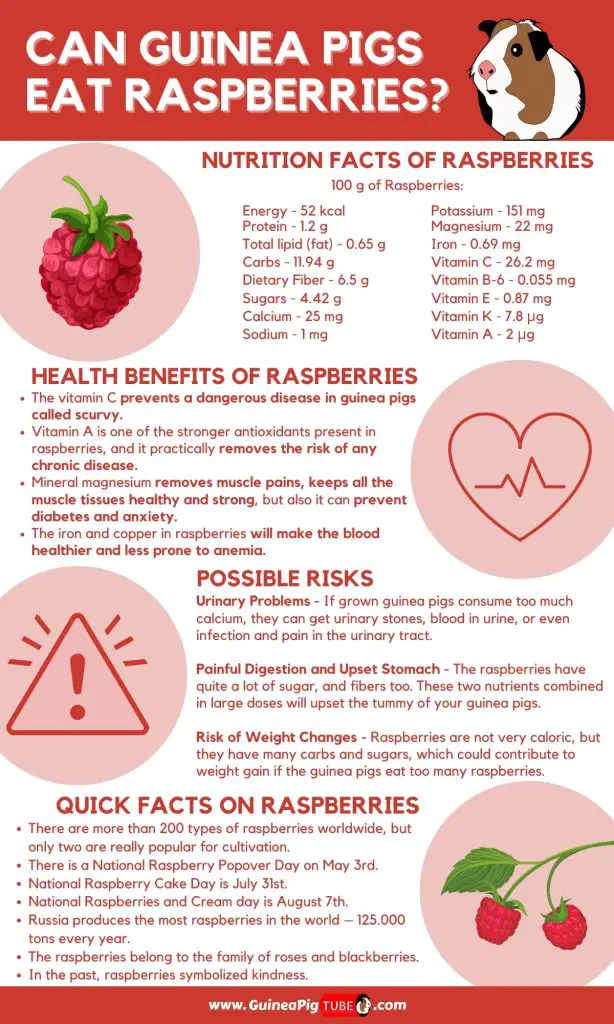
We have also made a full list of foods that guinea pigs can and can’t eat (150+ Types of Foods). Be sure to also check our recommended products page for everything you will ever need to assure a happy life for your guinea pigs. Hope this information was helpful and you have found the answer you were looking for.
List of Sources
Nutrient Requirements of Laboratory Animals: Fourth Revised Edition
The Effects of Diet on Anatomy, Physiology and Health in the Guinea Pig
Bioactive Compounds and Antioxidant Activity in Different Types of Berries
